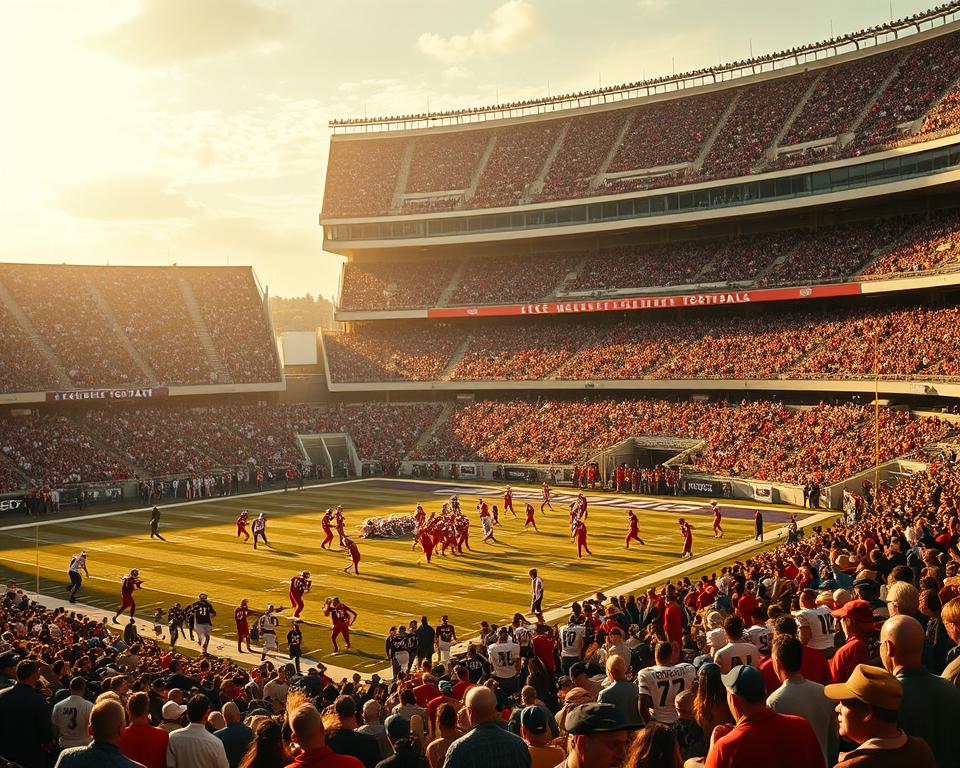Football teams are more than just groups of players—they’re symbols of passion, strategy, and history. Whether you’re a lifelong fan or new to the game, this guide explores what makes certain football teams stand out. From Super Bowl champions to college powerhouses, we’ll uncover which squads have left the biggest marks.
Ever wonder which teams shaped the sport’s legacy? Or what separates average teams from all-time greats? This article breaks down the facts, myths, and stories behind the football teams that dominate fields and fan hearts alike.
Key Takeaways
- Learn which football teams hold the most titles and why.
- Discover how strategies and coaching shape top teams.
- Explore the cultural impact of iconic football teams.
- Uncover rising stars and trends in modern football.
- Compare past legends with today’s contenders.
Overview of Football Teams
Football’s elite NFL teams thrive on more than just talent. Great squads blend skill, strategy, and unity to dominate the gridiron. Let’s break down what sets the best apart from the rest.
What Defines a Great Football Team?
- Teamwork: Players must act as one unit, whether blocking, passing, or celebrating wins.
- Coaching wisdom: Leaders like Bill Belichick show how visionary coaching shapes NFL teams into champions.
- Consistency: Year-after-year competitiveness proves a team’s resilience, like the Pittsburgh Steelers’ dynasty.
Key Characteristics of Successful Teams
Top-tier teams share common traits:
- Strong defense: A rock-solid D forces opponents into mistakes.
- Adaptability: Adjusting plays mid-game keeps NFL teams ahead of trends.
- Lasting legacy: Hall of Famers and iconic moments build a franchise’s reputation.
These elements combine to create the kind of powerhouse teams that inspire fans and dominate leaderboards.
History of Football in the United States
Football’s journey in America began in the 1800s, rooted in college competition. Early college football teams like Harvard and Princeton staged informal matches, blending rugby and soccer rules. By 1869, the first intercollegiate game occurred between Rutgers and Princeton, sparking a national trend.

Early Days of American Football
Walter Camp, known as the “Father of American Football,” redefined the sport in the 1880s. He introduced the line of scrimmage and scoring system, shaping modern gameplay. College football teams became cultural icons, with schools like Yale and Michigan building early programs. By the 1890s, over 100 colleges played the game, turning it into a campus staple.
Evolution of the Game
- 1906: The NCAA formed to standardize rules, addressing safety concerns.
- 1920s: College games drew massive crowds, with Notre Dame’s “Four Horsemen” becoming national stars.
- 1930s–1950s: Television broadcasts boosted the sport’s reach, linking college rivalries to national audiences.
These milestones laid the foundation for today’s NFL and college football’s intertwined legacy. From campus fields to Super Bowls, the passion ignited by early college football teams continues to define the sport’s identity.
Top NFL Teams of All Time
From Super Bowl triumphs to iconic moments, some NFL teams have become synonymous with excellence. These popular football teams forged legacies that still resonate today.

Legendary Teams and Their Achievements
Teams like the 1980s San Francisco 49ers, led by Joe Montana, won four Super Bowls in nine years. The 2000s New England Patriots, under Tom Brady and Bill Belichick, redefined dynasty building with six championships. The Pittsburgh Steelers’ 1970s era featured “The Steel Curtain” defense, securing four Super Bowl wins. These squads set records and inspired future generations.
- 1972 Miami Dolphins: The only undefeated team in Super Bowl era with a 17-0 season.
- 1985 Chicago Bears: “Mononoke” defense dominated opponents en route to a Super Bowl win.
- 2012-2019 Patriots: Brady’s late-career success included two undefeated starts and five titles.
- Impact on Popular Culture
- “The Patriots’ dynasty wasn’t just about wins—it became a symbol of sustained excellence.” – NFL Analyst
These teams permeate culture through movies like S Friday Night Lights, video games like Madden NFL, and TV highlights. Their stories fuel documentaries and fan debates. The 49ers’ “Catch” by Dwight Clark became a pop-culture reference, while the Patriots’ comeback wins inspired the phrase “Belichickian strategy.”
These teams remain touchstones for what makes the NFL unforgettable—relentless competition and timeless moments.
Prominent College Football Teams
College football’s legacy thrives on storied programs and historic matchups. Programs like Alabama, Ohio State, and Notre Dame consistently rank among the top football teams, driving passion on campuses nationwide. These schools build legacies through decades of competition and triumph.

Rivalries That Shaped College Football
Some rivalries transcend sport, uniting fans and fueling decades of drama:
- Alabama vs. Auburn: The Iron Bowl’s annual clash combines state pride and SEC dominance.
- Michigan vs. Ohio State: The “Game of the Century” nickname reflects their long-standing Big Ten rivalry.
- Notre Dame vs. USC: A historic clash between Catholic schools, now part of the Fighting Irish’s independent status.
Notable Championships and Titles
These programs have claimed over 60 national titles combined:
- Alabama: 18 championships since 1925, including 8 under Nick Saban.
- Ohio State: 8 titles, including back-to-back wins in 2014-2015.
- Notre Dame: 11 championships, with 1973’s “Fighting Irish” dynasty.
These top football teams continue shaping the sport’s future, inspiring new generations of athletes and fans alike.
International Football Teams to Watch
Global football thrives beyond U.S. borders, with professional football teams from nations like Brazil, Germany, and Argentina building legacies. These countries blend tradition with cutting-edge talent, shaping the sport’s future.

Countries with Strong Football Traditions
European and South American leagues dominate globally:
- Brazil: Home to legends like Pelé, producing skill-driven professional football teams since the 1950s.
- Germany: Known for tactical precision, winning four World Cups and nurturing top-tier clubs like Bayern Munich.
- Spain: La Liga’s Barcelona and Real Madrid redefine creativity, influencing worldwide styles.
Future Stars in International Play
“The next generation will bridge continents, blending speed and strategy.” — Marco Silva, Sporting Director, Everton FC
Watch for rising stars like:
- Phillynden “Philly” Johnson (England): Rising Manchester United prospect known for agility.
- Lucas Moura (Brazil): Tottenham’s forward blending pace and vision.
- Carli Lloyd (USA): Goal-scoring veteran inspiring younger players.
These professional football teams and athletes reflect football’s global unity, proving talent flows beyond borders.
The Role of Football Coaches
Coaches are pivotal in shaping the success of football teams, from NFL legends to international football teams. Their vision and leadership turn players into champions and strategies into legacies.
Iconic Coaches and Their Contributions
Nick Saban’s Alabama dynasty relied on discipline and preparation. Bill Belichick’s Patriots mastered defensive genius, while Pep Guardiola’s Barcelona revolutionized possession-based play. These leaders’ innovations influence both college programs and international football teams globally.
Coaching Styles That Lead to Success
Effective coaches blend tradition with innovation. Here’s how:
-
- Defensive mastery: Limiting opponents through relentless preparation.
- Tactical creativity
: Designing plays that disrupt rival strategies.
- Adaptability: Adjusting mid-game to seize momentum.
“The name of the game is preparation,” said Bill Belichick, emphasizing the meticulous planning behind every victory.
Coaches who balance passion with precision create winning cultures. Their methods inspire not just NFL titles but also the tactical evolution of international football teams worldwide.
Impact of Fans on Football Teams
Fans aren’t just spectators—they’re the lifeblood of the best football teams. Their passion transforms stadiums into electric arenas, shaping team identity through unwavering support and unique rituals.
How Fan Culture Shapes Team Identity
Fan traditions turn games into cultural events. The Seattle Seahawks’ “12th Man” chant isn’t just noise; it’s a symbol of unity. Players often credit this energy for clutch performances. Similarly, Green Bay Packers fans’ “Lambeau Leap” after touchdowns blends team pride with community spirit.
“Our fans aren’t in the stands—they’re on the field.” – Seahawks Official Website
Notable Fan Traditions Across Teams
| Team | Tradition | Example |
|---|---|---|
| Green Bay Packers | Lambeau Leap | Players jump into the stands after touchdowns |
| Seattle Seahawks | 12th Man | Fans rise during critical moments to overwhelm opponents |
| New England Patriots | “Decibel Dementia” | Fans use cowbells and chants to unsettle visitors |
Fan culture turns stadiums into battlegrounds where loyalty and creativity fuel the best football teams. From raucous chants to century-old rituals, these bonds prove that victory isn’t just won on the field—it’s built in the stands.
The Evolution of Team Strategies
Football strategies are the hidden plays shaping every game. Teams now blend classic tactics with modern analytics to gain an edge. Let’s break down how offenses and defenses adapt to win.
Offensive and Defensive Strategies Explained
Offensive strategies focus on creating opportunities. Play-calling, QB decisions, and formations like the wildcat offense aim to outsmart defenses. Defenses respond with blitz packages or zone coverages. Coaches like Bill Belichick use schemes to disrupt opponents’ plans.
- Offense: Passing-heavy systems (e.g., Chiefs’ “Air Raid”) vs. balanced run-pass mixes.
- Defense: Press-man coverage or 3-4 front alignments to pressure quarterbacks.
“The best strategies are those that surprise and adapt.” – Bill Belichick, New England Patriots
How Strategy Influences Game Outcomes
Small adjustments can change games. A no-huddle offense speeds up plays, tiring defenses. In Super Bowl LIV, the Chiefs’ aggressive passing beat the 49ers’ defense. Analytics now track opponent tendencies to predict and counter moves.
Teams using hybrid strategies dominate. The Patriots’ use of data-driven decisions since 2001 proves strategy’s power. Coaches like Andy Reid mix creativity with fundamentals to outplay rivals.
Future Trends in Football Teams
Football’s next chapter will see technology reshape how teams compete. From training rooms to draft boards, data-driven decisions are becoming central to success. Coaches and managers now rely on real-time metrics to improve player performance and game strategies.
The Rise of Analytics in Team Management
Advanced analytics already influence pro teams like the Kansas City Chiefs and Green Bay Packers. Wearable tech tracks player stamina, while AI predicts opponent moves. Scouting systems use video analysis to spot undervalued talent, giving clubs an edge in free agency and drafts.
Expectations for the Next Decade in Football
By 2033, virtual reality could simulate full practices, cutting injury risks. Rule changes might prioritize player safety, altering how teams build rosters. Fans can anticipate faster games with tech like instant replay expanded league-wide.
As innovation grows, the sport balances tradition with progress. Whether through smart stadiums or player health tech, football’s evolution ensures every season brings new surprises. Staying ahead means embracing change—and watching how stats and science rewrite gridiron history.
FAQ
What are some of the best NFL teams in history?
Some of the best NFL teams in history include the New England Patriots, Pittsburgh Steelers, and San Francisco 49ers. These teams have achieved remarkable success, securing multiple Super Bowl championships and showcasing exceptional talent and teamwork over the years.
Which college football teams have the most national championships?
Notable college football teams with the most national championships include the University of Alabama, the University of Notre Dame, and the University of Florida. Their storied histories are filled with intense rivalries and significant victories in college football history.
How are international football teams different from NFL teams?
International football teams, often referred to as soccer teams in the U.S., focus on a different style of play and adhere to the rules set by FIFA. The global aspect of these teams includes various leagues and tournaments, showcasing a wider range of playing styles and cultures compared to the structured format of NFL teams.
What defines a successful football team?
A successful football team typically exhibits strong leadership, cohesive teamwork, strategic planning, and a commitment to continuous improvement. Additionally, a rich history of wins and a dedicated fan base often contribute to a team’s overall success and reputation.
What impact do fan traditions have on football teams?
Fan traditions play a crucial role in shaping a team’s identity and culture. They foster an emotional connection between the team and its supporters, enhance the game-day experience, and can even influence team performance through vocal encouragement and community support.
Who are some iconic football coaches in NFL history?
Iconic coaches in NFL history include Vince Lombardi, Bill Belichick, and Don Shula. Their innovative strategies and leadership styles have significantly impacted their respective teams’ successes and the sport itself.
What are the current trends in football team strategies?
Current trends in football team strategies include the increased use of analytics, a focus on player health and wellness, and adapting offensive and defensive strategies to counter evolving game dynamics. These trends allow teams to maximize performance and gain competitive advantages.





























































